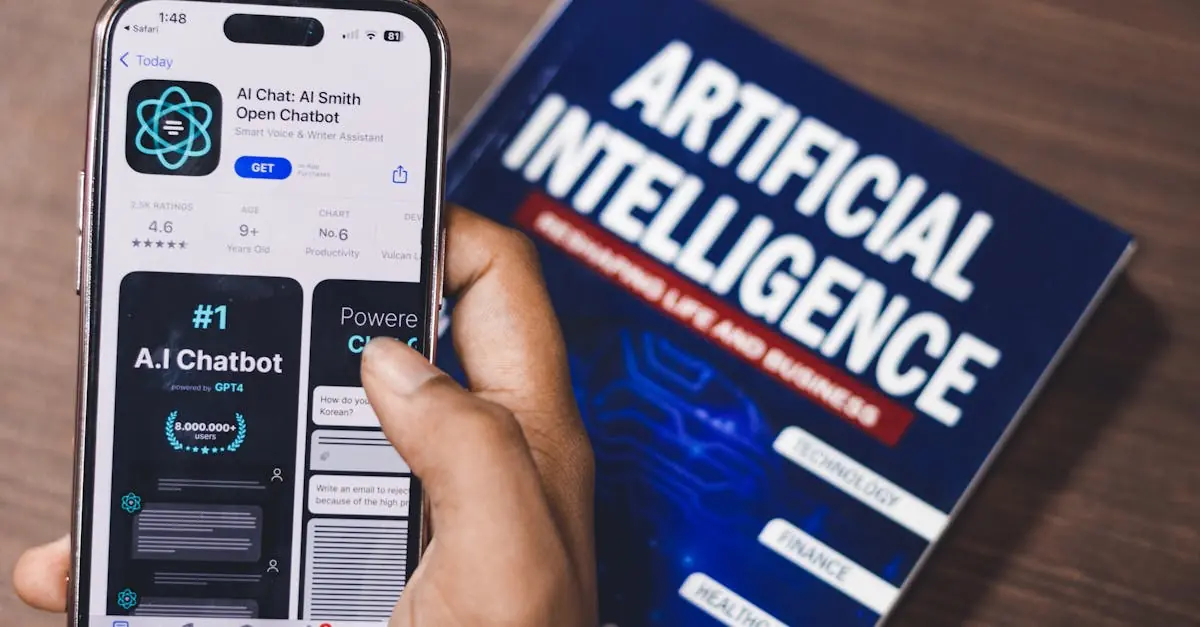Artificial intelligence isn’t just a buzzword anymore; it’s the stuff of sci-fi dreams and a little bit of nightmare fuel. As machines get smarter, the question isn’t whether they’ll take over the world, but rather how well humans can keep up with them. Luckily, a treasure trove of books exists to help navigate this brave new world.
Table of Contents
ToggleOverview of Artificial Intelligence Literature
Artificial intelligence literature has expanded significantly, reflecting its growing importance in various sectors. Readers find a range of books that cover foundational concepts and advanced applications in AI. For beginners, several titles provide clear introductions to the principles behind AI technologies.
Notably, works by influential authors explore ethical implications and societal impacts. Books often delve into the history of AI, tracing its evolution from theoretical constructs to real-world applications. Such explorations help individuals grasp how AI affects daily life and industry operations.
Scholarly texts offer detailed examinations of algorithms and machine learning techniques. These resources serve as toolkits for professionals looking to implement AI solutions in business contexts. Dedicated chapters in some books focus on case studies that highlight AI’s successes and challenges in various fields.
Many authors emphasize the necessity of interdisciplinary approaches in AI research. Insights from psychology, neuroscience, and philosophy help enrich discussions surrounding AI development. Readers benefit from diverse perspectives that contribute to a well-rounded understanding of the technology.
Moreover, literature dedicated to AI ethics frequently addresses concerns related to bias, privacy, and accountability. Such discussions prompt critical thinking about responsible AI use and development. Engaging with these texts enables practitioners to consider broader societal implications while working on AI projects.
Overall, the landscape of artificial intelligence literature offers comprehensive resources. By examining various genres and topics, readers can navigate the nuances of AI, preparing for an increasingly automated world.
Criteria for Selecting the Top 5 Books
Selecting top books on artificial intelligence involves multiple criteria. This ensures readers gain valuable insights from the texts chosen for their relevance and quality.
Relevance to Current Trends
Books must reflect the latest developments in artificial intelligence. The intersection of AI with fields like healthcare, finance, and education illustrates its expansive impact. Titles addressing current applications and ongoing research trends resonate with readers. Important social issues, such as ethical concerns and AI governance, enhance a book’s relevance. Readers benefit from understanding how AI technology evolves continuously and affects everyday life.
Author Expertise
Expertise of authors plays a vital role in determining a book’s value. Authors with established backgrounds in AI research lend credibility. Experienced practitioners sharing practical insights widen the scope of understanding. Many respected authors contribute towards shaping the field, making their works particularly influential. Evaluating an author’s qualifications and previous publications helps ensure the selection of reliable and informative content.
Book Reviews
The following books offer valuable insights into artificial intelligence, suitable for readers with varying levels of expertise.
Book 1: “Artificial Intelligence: A Guide to Intelligent Systems”
This book by Michael Negnevitsky explores essential concepts in AI. It covers algorithms and techniques such as neural networks and decision trees. Its structured approach allows beginners to grasp complex ideas easily. The text emphasizes practical applications across various industries, illustrating AI’s potential in real-world scenarios. Users will find case studies and examples that enhance understanding.
Book 2: “Superintelligence: Paths, Dangers, Strategies”
Nick Bostrom presents a profound examination of potential future advancements in AI. This book focuses on the implications of superintelligent systems and their impact on society. Bostrom discusses the uncertainties surrounding AI development and the ethical considerations involved. Readers gain insight into strategic approaches to ensure beneficial outcomes. His analysis encourages critical thinking about the risks associated with advanced technologies.
Book 3: “Life 3.0: Being Human in the Age of Artificial Intelligence”
Max Tegmark’s work addresses the intersection of AI and humanity’s future. This book emphasizes the importance of developing AI responsibly. Tegmark discusses various scenarios, urging readers to consider the long-term implications of intelligent systems. Multiple perspectives on potential societal shifts are provided. His engaging style captivates readers while prompting thoughtful discussions on AI’s role in shaping our world.
Book 4: “Weapons of Math Destruction: How Big Data Increases Inequality and Threatens Democracy”
Cathy O’Neil critiques algorithms and data usage in societal contexts. The book highlights how biased models can perpetuate inequality. O’Neil uses real examples to illustrate the dangers of unregulated AI applications. Readers are challenged to consider the ethical ramifications of big data. This text serves as a call to action for responsible AI development and accountability.
Book 5: “Human Compatible: Artificial Intelligence and the Problem of Control”
Stuart Russell tackles the challenges of aligning AI systems with human values. This book delves into the complexities of ensuring AI remains beneficial. Russell emphasizes the need for rigorous safety measures and control mechanisms. His insights into cooperative AI models offer thoughtful solutions to potential risks. Readers will appreciate the blend of theoretical analysis and practical guidance.
Final Thoughts on the Book Selections
The exploration of artificial intelligence through literature provides essential insights into its varied applications and ethical implications. Each book selected captures critical aspects of AI, making them valuable resources for readers. Readers seeking foundational knowledge should consider “Artificial Intelligence: A Guide to Intelligent Systems” by Michael Negnevitsky. This book serves as a practical entry point, introducing key concepts and applications.
Nick Bostrom’s “Superintelligence: Paths, Dangers, Strategies” challenges audiences to think about the potential risks of advanced AI systems. It emphasizes the importance of considering ethical frameworks as AI evolves. Max Tegmark’s “Life 3.0: Being Human in the Age of Artificial Intelligence” presents a broad vision of how AI could reshape society. It engages readers in discussions about responsible development and long-term consequences.
Critically, Cathy O’Neil’s “Weapons of Math Destruction” addresses the real-world impact of biased algorithms. This work highlights the urgent need for scrutiny in AI deployment, particularly concerning societal effects. Stuart Russell’s “Human Compatible” extends this conversation, focusing on aligning AI with human values. The insights offered foster a better understanding of safety and ethical AI innovations.
Selection of these texts reflects current trends, ensuring relevance to sectors like healthcare, finance, and education. Interdisciplinary contributions within these books deepen understanding, fostering critical thinking about AI’s role in the future. Together, the chosen works equip readers with knowledge to navigate the complexities associated with AI, empowering them in an increasingly automated world.
Exploring the realm of artificial intelligence through these top five books offers invaluable insights into its complexities and implications. Each title serves as a gateway to understanding not only the technical aspects of AI but also the ethical dilemmas and societal impacts that come with it.
Readers can deepen their knowledge and enhance their critical thinking skills by engaging with these works. They provide a well-rounded perspective that prepares individuals for the challenges and opportunities presented by AI.
As technology continues to evolve, staying informed through literature will be essential for navigating the future landscape of artificial intelligence. These books are more than just resources; they’re tools for empowerment in an increasingly automated world.



